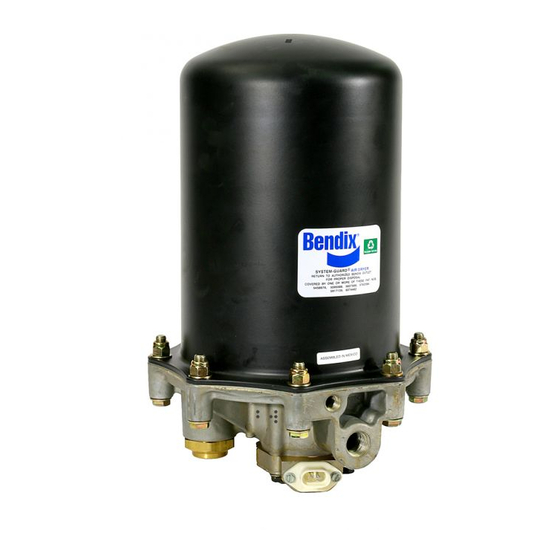BENDIX AD-9 Data Layanan - Halaman 4
Jelajahi secara online atau unduh pdf Data Layanan untuk Dehumidifier BENDIX AD-9. BENDIX AD-9 20 halaman.

SUPPLY
PORT
TURBO
CUTOFF
PISTON
EXHAUST
FIGURE 4 - AD-9 TURBO CUTOFF
At the onset of the purge cycle, the downward travel of the
purge piston is stopped when the turbo cut-off valve (tapered
portion of purge piston) contacts its mating metal seat in
the purge valve housing. With the turbo cut-off valve seated
(closed position), air in the discharge line and AD-9 inlet
port is restricted from entering the air dryer. While the turbo
cut-off effectively prevents loss of turbo charger boost
pressure to the engine, some seepage of air may be
detected under certain conditions of compressor engine and
turbo charger operation, even so there will always be low
pressure trapped in the discharge line.
PREVENTIVE MAINTENANCE
Important: Review the warranty policy before performing
any intrusive maintenance procedures. An extended warranty
may be voided if intrusive maintenance is performed during
this period.
Because no two vehicles operate under identical conditions,
maintenance and maintenance intervals will vary. Experience
is a valuable guide in determining the best maintenance
interval for any one particular operation.
Every 900 operating hours or 25,000 miles or every three
(3) months:
1. Check for moisture in the air brake system by opening
reservoirs, drain cocks, or valves and checking for
presence of water. If moisture is present, the desiccant
may require replacement; however, the following
conditions can also cause water accumulation and
should be considered before replacing the desiccant:
A. An outside air source has been used to charge the
system. This air did not pass through the drying bed.
4
PURGE
VALVE
CHECK
DISCHARGE
VALVE
LINE
ASSEMBLY
UPPER
BRACKET
STRAP
DESICCANT
CARTRIDGE
DESICCANT
BED
OIL
SEPARATOR
CONTROL
PORT
SUPPLY
PORT
TURBO
CUTOFF
PURGE VALVE
PISTON
HOUSING
ASSEMBLY
FIGURE 5 - AD-9 AIR DRYER SECTIONAL VIEW
B. Air usage is exceptionally high and not normal for a
highway vehicle. This may be due to accessory air
demands or some unusual air requirement that does
not allow the compressor to load and unload (com-
pressing and non-compressing cycle) in a normal
fashion. Check for high air system leakage.
C. The air dryer has been installed in a system that
has been previously used without an air dryer. This
type system will be saturated with moisture and
several weeks of operation may be required to dry it
out.
D. Location of the air dryer is too close to the air com-
pressor. Refer to Locating AD-9 On Vehicle section.
E. In areas where more than a 30 degree range of tem-
perature occurs in one day, small amounts of water
can accumulate in the air brake system due to con-
densation. Under these conditions, the presence of
small amounts of moisture is normal and should not
be considered as an indication that the dryer is not
performing properly.
Note: A small amount of oil in the system may be normal
and should not, in itself, be considered a reason to
replace the desiccant; oil stained desiccant can function
adequately.
2. Check mounting bolts for tightness. Retorque to 270-
385 inch pounds.
UPPER
BRACKET
HOUSING
LOWER
BRACKET
CHECK
VALVE
ASSEMBLY
DISCHARGE
PURGE
PORT
VALVE
